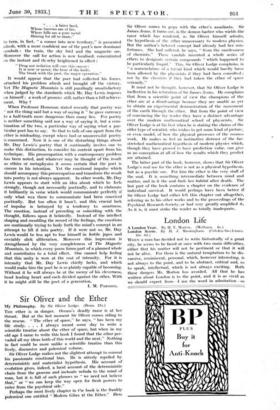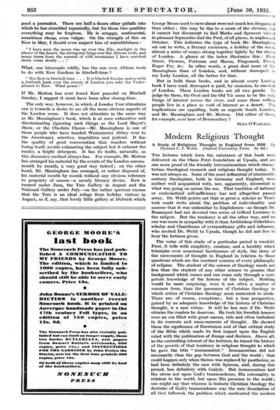London Life
A London Year. By H. V. Morton. (Methuen. 6s.) WHEN a man has decided not to write historically of a great city, he seems to be faced at once with two main difficulties, either that his matter will not be pertinent or that it will not be alive. For there is the natural temptation to be dis-
cursive, reminiscent, personal, which, however interesting, is not always to the point, and to be abstract, critical and, so to speak, intellectual, which is not always exciting. Both these dangers Mr. Morton has avoided. All that he has written about London is to the point, and it is as vivid as we should expect from—I use the word in admiration—so
good a journalist. There are half a dozen other pitfalls into which he has stumbled repeatedly, but for those two qualities everything may be forgiven. He is scrappy, sentimental, sometimes cheap, even vulgar. On the strength of this on Kew in May, I should even suspect him of untruthfulness : "I have seen the moon rise up over the Nile, starlight in the silence of the desert, the strong sun lying over flat African roofs, and many times from the summit of cold mountains I have watched dawn come slowly. ."
What, one interrupts coldly, has the sun over African roofs to do with 'Kew Gardens in bluebell-time ?
"But Kew in bluebell-time .. . It is bluebell Sunday and so with Sabbath hush over the streets of London you take the Under- ground to Kew. What peace ! "
If Mr. Morton has ever found Kew peaceful on Bluebell Sunday, I suggest it must have been after closing-time.
The only way, however, in which A London Year stimulates one is towards a desire to see all the more obvious aspects of the London scene. It does not stimulate in the same way as Mr. Massingham's book, which is at once exhaustive and discriminating (ignoring such things as the Lord Mayor's Show, or the Cheshire Cheese—Mr. Massingham is one of those people who have handed Westminster Abbey over to the Americans), selective, inquisitive and judicial. It has the quality of good conversation that wanders without losing itself, avoids exhausting the subject lest it exhaust the reader, a bright detergent. It has its faults, naturally, as this discursive method always has. For example, Mr. Morton has arranged his material by the events of the London seasons month by month, a very good way indeed ; on the other hand, Mr. Massingham has arranged, or rather disposed of, his material month by month without any obvious reference to propriety of season—a merely literary device. Kew is treated under June, the Tate Gallery in August and the National Gallery under July—on the rather specious excuse that the Tate is an ideal refuge from holiday visitors in August, as if say, that lovely little gallery at Dulwich which George Moore used to rave about were not much less frequented than either ; this may be due to a scorn of the obvious, hut it cannot but disconcert to find Marks and Spencers visital in pleasant September and the Pool, of all places, in unpleasant October. This indicates the type of book Mr. Massinghani set out to write, a literary excursion, a holiday of the mind, almost a series of essays strung together lightly by the charm of London. A glance at the index illustrates this : Fleet Street, Flowers, Fortnum and Mason, Fragonard, Freud, Roger Fry, &c. In other words, a great deal more of Mr. Massingham than of London, and, without disrespect to my Lady London, all the better for that.
But in both these books, and in almost every London book I have read, disrespect is paid, by omission, to one-half of London. These London books are all rive gauche. To judge by them, the Oval and the Old Vic seem to be the only things of interest across the river, and some three million people live in a place as void of interest as a desert. The implications are appalling, both as regards South London, and Mr. Massingham and Mr. Morton. Did either of them, for example, ever hear of Bermondsey ?
SEAN O'FAOLIIN.











































 Previous page
Previous page